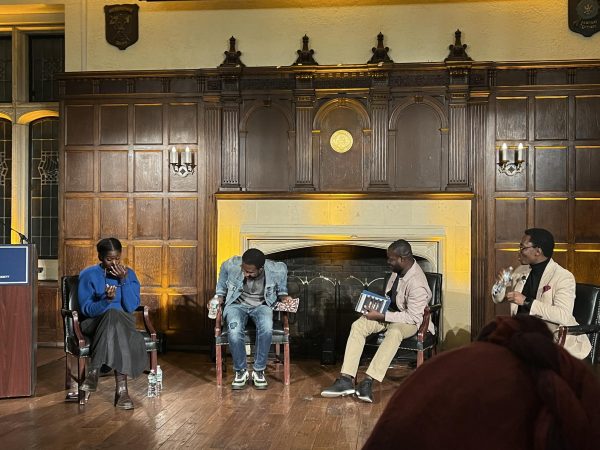Four poets of African descent shared their poems and reflected on their writing experiences at a poetry reading held by the Georgetown University Lannan Center for Poetics and Social Practice on Feb. 6.
The Lannan Center, a literary institution that aims to increase engagement with contemporary written art, invited poets Victoria Adukwei Bulley, Saddiq Dzukogi, Henneh Kyereh Kwaku and Tolo Oloruntoba for an event to commemorate Black History Month, which takes place each February. All four poets read aloud poems from their published work, touching on their African heritage and individual experiences with colonial legacies.
Bulley said that her experience joining the Barbican Young Poets, a program connecting writers, helped motivate her to share her poems with the world, in addition to adding new dimensions to her writing.
“I was writing by myself, for myself, for a very long time, and that gave me a sense of ‘I’m enjoying this, and this is mine.’ I still have that, and I think it was foundational, but then I joined this ongoing workshop called the Barbican Young Poets,” Bulley said at the event. “Up until that point, it had been this thing I enjoyed, but privately. I think that having a community was a real motor because it made me aware of what I was doing.”

Bulley published her debut collection, “Quiet,” in 2022, and has since won the 2023 Rathbones Folio Prize, an award for works of literary fiction, and been shortlisted for several additional awards, including the T.S. Eliot Prize and the Pollard Poetry Prize.
Kwaku is the author of the collection “Revolution of the Scavengers” and worked as the 2022 resident at the Library of Africa and the African Diaspora near Accra, Ghana.
Like Bulley, his poetry touched on his feelings towards his country and the violence that it has faced.
“I want to get a pet one day — a cat maybe — or a dog / And name it after my country so each poem I write for it / Is also for my country. I want a messy pet — a beautiful pet / A pet that’s a metaphor for my country. That when I say / ‘My pet tore my life apart today,’ I also mean my country / Tore my life apart. When I say my pet is beautiful, I also mean / My country is beautiful,” Kwaku read at the event.
Oloruntoba said poetry began as a hobby for him but later blossomed into a serious profession.
“I wrote one and then another one and another one and another one, and then I started to have enough to put into a Word document, which started to get bigger as well,” Oloruntoba said. “The cliche is ‘one foot in front of the other,’ but you build a career by writing one at a time.”
Oloruntoba wrote the collections “Each One a Furnace” and “The Junta of Happenstance,” the latter of which won the Griffin Poetry Prize and the Governor General’s Literary Award for Poetry, both of which are Canadian literary awards for poetry written in English.
Dzukogi is an assistant professor of English at Mississippi State University and published his collection “Your Crib, My Qibla” in 2021. The collection won the Derek Walcott Prize for Poetry, awarded to an author who is not a citizen of the United States but whose work was published in English, and the Julie Suk Award, for best poetry book published by a literary press.
Dzukogi touched on the relationships and interconnection between many African cultures, describing colonization as lines being drawn between peoples. He said his poetry is an act of rebellion against the ever-present effects of colonialism.
“I don’t know if I can, or we can, erase those lines, because they exist and we have created newer history. But I think it’s important to reclaim those disruptive narratives, to understand who we are, where we come from, that we’re all connected,” Dzukogi said.
Bulley said that her poetry works to combat the effects of colonialism in small ways, and used the motif of “the belly of the beast” to refer to existing in colonized spaces. Bulley also touched on her feelings about coming to Georgetown in particular, due to the university’s historical relationship with slavery.
“This trip hit me differently than my previous visits to the U.S. I was thinking about Georgetown and thinking about what I’ve been reading about the history of this place that was built by enslaved people with enslaved labor. I move through these different shapes of beasts, and the beasts that live in the language that I speak, and I try to sicken that beast,” Bulley said.
“I try to sicken it by throwing things in the belly to break up the heartbeat of that beast. I try to interrupt its rhythms. I try to confuse it and to be a stitch in its side,” she added.
Dzukogi said his current project is an epic poem, a book-length narrative written in verse, and was inspired by comments that Nigerian culture, along with other African cultures, lack myth and stories. He added that a lack of recorded family histories made those comments particularly hurtful.
“I obsess about naming, because I just don’t know. There’s absence,” Dzukogi said. “I don’t even know what my great-great grandmother was called. It’s not written anywhere, and there’s a hunger, not just to figure it out for myself, but to say, ‘We are not a people without myth. We are people, and we have lots of myths, lots of gods before you stole them.’”








